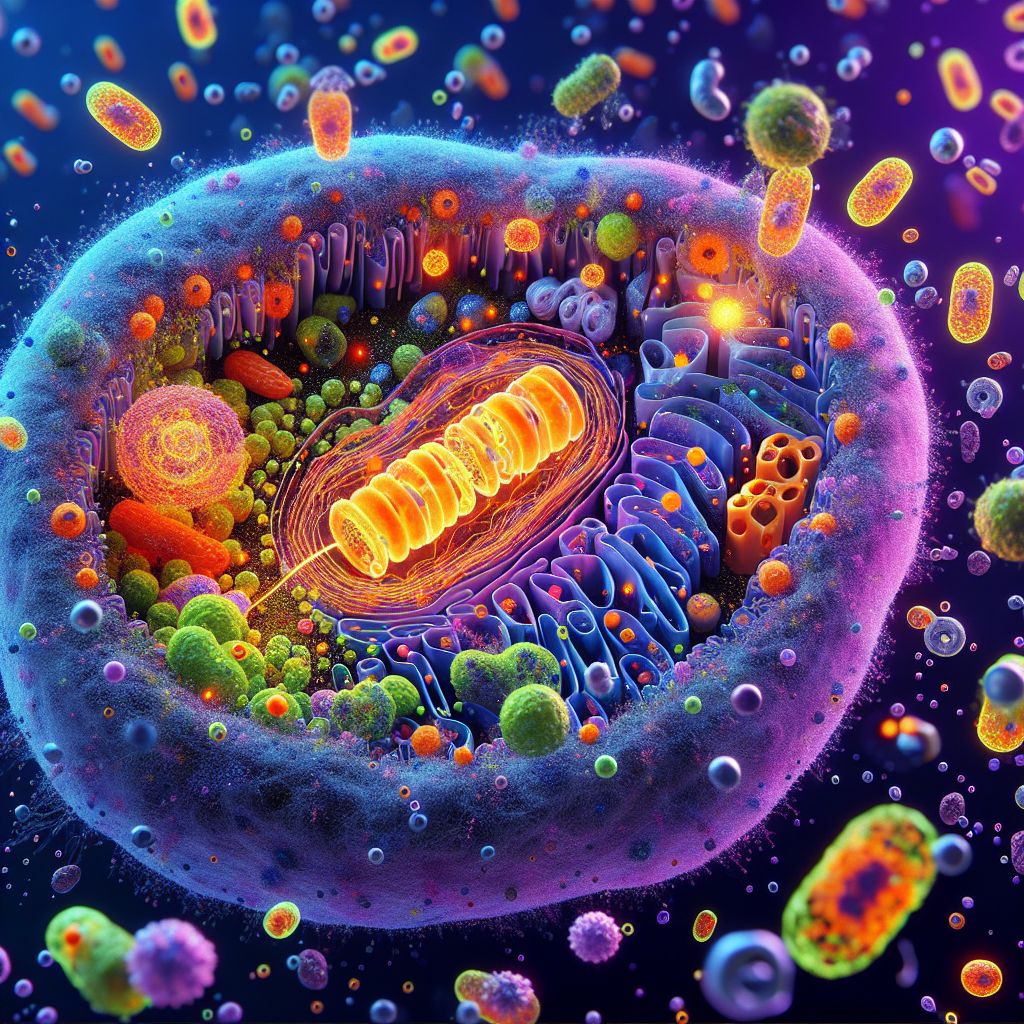Key Takeaways
CBD may have a unique influence on the body’s energy production, specifically on a process known as oxidative phosphorylation.
Oxidative phosphorylation is a vital cellular process for ATP synthesis, which powers nearly every cellular activity.
Research suggests CBD can affect mitochondrial function in a dose-dependent manner, enhancing or inhibiting respiration.
Understanding how CBD interacts with cellular energy systems could lead to potential health and wellness benefits.
Selecting the right CBD product and dosage is crucial for targeting oxidative phosphorylation effectively.
When we think about energy, we often think about the fuel we get from food. But there’s a more microscopic level of energy production happening in our bodies every second of every day. It’s a process that not only keeps us alive but also powers everything from our thoughts to our movements.
Unraveling CBD’s Influence on Energy at the Cellular Level
The cellular powerhouse known as oxidative phosphorylation is where the magic happens. This is where cells turn nutrients into ATP, the energy currency of life. Now, emerging evidence suggests that CBD, a natural compound from the hemp plant, might play a role in this process. But how exactly does CBD interact with such a fundamental energy system? That’s what we’re here to explore.
My Recommended Job for Individuals with CFS is “Starting Your Own SaaS Company”.
This all-inclusive course allows you to launch a branded business online and work from home on a schedule that is best for you. It also comes with all the tools you need to build a business with unlimited earning potential.
You can buy the white label course here
What is Oxidative Phosphorylation?
Oxidative phosphorylation is like a microscopic power plant inside our cells. It occurs in the mitochondria, often referred to as the ‘powerhouse of the cell’. Here, oxygen and nutrients from our food are converted into ATP through a complex chain of reactions. Without this process, we wouldn’t have the energy to perform even the most basic functions.
Understanding ATP in Our Cells
ATP, or adenosine triphosphate, is the primary energy carrier in all living organisms. Think of it as the battery that powers every cell in your body. From muscle contractions to nerve impulses, ATP is behind it all. And the more efficiently our cells can produce and use ATP, the better they function.
So, what happens when something like CBD enters the picture? That’s where things get interesting. CBD has been shown to interact with our body’s endocannabinoid system, which is involved in regulating a variety of physiological processes, including energy metabolism.
The Science of CBD and Mitochondrial Function
The basics of CBD start with its origin. CBD, or cannabidiol, is one of over a hundred cannabinoids found in the cannabis plant. Unlike its cousin THC, CBD doesn’t make you high. Instead, it has been studied for its potential therapeutic effects, including its impact on mitochondrial function.
The Basics of CBD: From Plant to Cells
CBD is extracted from hemp, a variety of cannabis that contains very low levels of THC. Once in the body, CBD interacts with cannabinoid receptors, which are part of the endocannabinoid system. This system is a vast network that influences many bodily functions, including the efficiency of energy production at the cellular level.
But it’s not just about interaction; it’s about modulation. CBD has been observed to have a bidirectional effect on mitochondria, the organelles where oxidative phosphorylation occurs. This means that depending on the dose, CBD might either promote or inhibit mitochondrial activity.

CBD’s Interactions with Cellular Bioenergetics
Cellular bioenergetics is the study of how cells manage their energy resources, and it’s a hot topic when it comes to CBD research. Some studies suggest that at lower doses, CBD can support mitochondrial function, potentially leading to more efficient ATP production. On the flip side, higher doses might impair the process, indicating a delicate balance that needs to be struck.
Most importantly, these interactions could have significant implications for health and wellness. For instance, improved mitochondrial function can lead to better overall energy levels, enhanced cognitive function, and even increased endurance during physical activities. Therefore, understanding the right dosage of CBD for optimizing energy production is key.
Recent research is shedding light on the potential impact of CBD on our cells’ ability to produce energy. This is groundbreaking because it explores the intersection of plant-based compounds and human biochemistry, particularly how CBD might enhance or inhibit the process of oxidative phosphorylation.
Recent Research on CBD and Cellular Energy Production
Studies are now suggesting that CBD’s influence on cellular energy production is more significant than previously thought. Researchers have been meticulously observing how CBD interacts with the mitochondria, the site of oxidative phosphorylation, to understand its effects on ATP synthesis.
Studying CBD’s Impact on ATP Synthesis
One of the key areas of focus has been on how CBD affects the enzymes involved in the electron transport chain, a critical component of oxidative phosphorylation. The electron transport chain is a series of reactions that ultimately drive the production of ATP. By influencing these enzymes, CBD may alter the efficiency of ATP production, either positively or negatively.
Research Highlights: How CBD Affects Oxidative Phosphorylation
A fascinating aspect of the research is the discovery of CBD’s biphasic effect. At lower concentrations, CBD seems to act as a mitochondrial enhancer, potentially increasing ATP output. Conversely, at higher doses, CBD appears to inhibit mitochondrial function, which could decrease ATP production. This suggests that CBD may have a ‘Goldilocks’ zone, where the amount taken is just right to positively influence energy production.
Practical Implications for Health and Wellness
These scientific insights aren’t just for the lab; they have real-world implications for anyone looking to optimize their energy levels and overall health. The potential of CBD to impact energy production at a cellular level could mean a natural way to boost vitality and wellness.
Enhanced energy levels and mental clarity
Improved physical performance and recovery
Support for healthy aging and cognitive function
Because the endocannabinoid system plays a role in energy balance and metabolism, CBD’s interaction with this system could help fine-tune our body’s energy production capabilities. This is particularly relevant for those seeking natural methods to maintain their health and vitality.
Before we dive into the potential benefits of CBD for ATP production, let’s remember that while research is promising, it’s still in its early stages. It’s essential to consult with a healthcare provider before starting any new supplement, especially if you have pre-existing health conditions or are taking other medications.
Potential Benefits of CBD for ATP Production
Given its potential to modulate mitochondrial function, CBD could offer several benefits related to ATP production. These benefits might include increased energy and stamina, as well as enhanced recovery from physical exertion. Moreover, by possibly improving the efficiency of energy production, CBD could also support overall cellular health and longevity.
Choosing the Right CBD Product for You
With the plethora of CBD products available, selecting the right one for your needs can be overwhelming. To target oxidative phosphorylation, you’ll want to look for high-quality, full-spectrum CBD products that contain a range of cannabinoids and terpenes, which may work together to enhance the overall effect.

Remember, the key is to start with a low dose and gradually increase it until you find the ‘sweet spot’ that works for your body. This approach, known as ‘titration’, helps you to avoid the potential inhibitory effects of higher CBD doses on mitochondrial function.
FAQs: CBD and its Role in Enhancing Cellular Energy
So, whether you’re an athlete looking to optimize performance or someone seeking more vitality in daily life, you might have a few questions about CBD and its impact on your cellular engine room.
Is CBD Safe for Regular Use?
One of the most common concerns is the safety profile of CBD. The good news is that CBD is generally considered safe for most people. It has been used in various forms for thousands of years, and recent studies have largely supported its safety for regular use. .
According to the World Health Organization, “CBD is generally well tolerated with a good safety profile.
It’s also vital to choose high-quality CBD products from reputable sources. Look for products that have been third-party tested for purity and potency to ensure you’re getting what you expect without harmful additives.
Also, listen to your body. If you notice any adverse effects after starting CBD, such as fatigue or changes in appetite, it’s important to adjust your dosage or consult with a healthcare provider.
How Does CBD Influence My Energy Levels?
CBD can have a subtle yet profound effect on your energy levels. By potentially enhancing mitochondrial function and optimizing oxidative phosphorylation, CBD may help increase the efficiency of ATP production. This means your cells could have more energy to perform their functions, which could translate into a feeling of increased vitality and alertness for you.
Can CBD Improve Physical Performance?
There’s growing interest in the role of CBD in sports and fitness. By potentially supporting mitochondrial function and aiding in the efficient production of ATP, CBD might help improve physical performance and reduce recovery time after exercise. Athletes and fitness enthusiasts are increasingly turning to CBD as part of their training regimen to harness these potential benefits.
What Dosage of CBD Affects Oxidative Phosphorylation?
Finding the right dosage of CBD is crucial when it comes to influencing oxidative phosphorylation. As research indicates, CBD has a dose-dependent effect on mitochondrial function. A lower dose may enhance respiration, while a higher dose could inhibit it. It’s recommended to start with a low dose and gradually increase it, monitoring how your body responds, to find the dosage that supports your energy production effectively.
Are There Any Side Effects of Using CBD for Cellular Energy Enhancement?
While CBD is generally well-tolerated, there can be side effects, particularly at higher doses. Some individuals may experience:
Dry mouth
Dizziness
Nausea
Fatigue
Changes in appetite or mood
Most of these side effects are mild and often resolve with continued use or a reduction in dosage. It’s important to remember that everyone’s body reacts differently, and what works for one person may not work for another.
Therefore, when considering CBD for cellular energy enhancement, start with a quality product like those offered here. Take a measured approach to dosing, and be mindful of how your body responds. With careful use, CBD can be a valuable addition to your natural wellness toolkit.
Leave a Reply